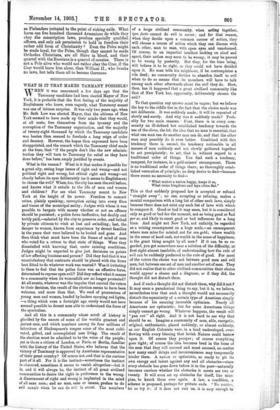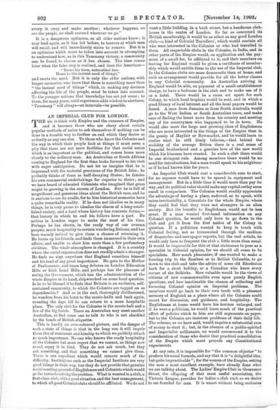WHAT IS IT THAT MAKES TAMMANY POSSIBLE?
WHEN it was announced a few days ago that the Tammany candidate bad been elected Mayor of New York, it is probable that the first feeling of the majority of Englishmen who knew, even vaguely, what Tammany meant was one of intense surprise. It was only two years ago, when Mr. Seth Low was elected Mayor, that the citizens of New York seemed to have made up their minds that they would, at all costs, free themselves from the tyranny and the corruption of the Tammany organisation, and the majority of twenty-eight thousand by which the Tammany candidate was beaten then seemed to forebode a long reign of order and decency. However, the hopes then expressed have been disappointed, and the remark which the Tammany chief made at the time, that " if the people don't like the new adminis- tration they will turn to Tammany for relief as they have done before," has been amply justified by events.
What is the reason ? What is it that makes it possible for a great city, seeing huge issues of right and wrong—and not political right and wrong, but ethical right and wrong—set clearly before its eyes deliberately (as it seems to Englishmen) to choose the evil ? When, too, the city has seen the evil before, and knows what it entails to the life of men and women and children ? For see what Tammany meant to New York at the height of its power. Freedom to commit crime, plainly speaking ; corruption eating into every fibre and tissue of the municipal entity; Judges with whom it was possible to bargain with money whether or not an offence should be punished; a police force ineffective, but doubly and trebly paid,—salaried by the city to preserve order, and bribed by private citizens to wink at lust and swindling ; last, the danger to women, known from experience by decent families in the years that were believed to be buried and gone. And then think what must have been the frame of mind of men who voted for a return to that state of things. Were they dissatisfied with knowing that, under existing conditions, Judges might be expected to give just decisions on points of law affecting business and person ? Did they feel that it was unsatisfactory that contracts should be placed with the firms best fitted to do whatever work was wanted ? Was it irritating to them to feel that the police force was an effective force, determined to repress open evil Did they reflect what it means to a community when its womenfolk are no longer protected ? At all events, whatever was the impulse that carried the voters to their decision, the result of the election seems to have been welcome, and more than that. We read of processions of young men and women, headed by leaders carrying red lights, —a thing which even a fortnight ago surely would not have seemed possible to decent men able to understand the force of the symbolism.
And all this in a community whose scroll of history is glorified by the names of some of the world's greatest and justest men, and which numbers among its four millions of inheritors of Shakespeare's tongue some of the most culti- vated, gifted, and accomplished men living. The result of the election must be admitted to be the voice of the people; yet is there a citizen of London, or Paris, or Berlin, familiar with the history of the United States, who believes that the victory. of Tammany is approved by Americans representative of their great country? Of course not, and that is the curious part of it all. For it is the instinct—sometimes the instinct is obscured, sometimes it seems to vanish altogether—but it is, and it will always be, the instinct of all great civilised communities to desire the right in preference to the wrong.
A discernment of right and wrong is implanted in the mind of all sane men ; and no man, sane or insane, prefers to do evil opeali when he can do evil in secret. The members of a large civilised community, when acting together, ipso facto cannot do evil in secret ; and for that reason, when they decide upon a common course of action, they will choose a course of action which they can discuss with each other, man to man, with open eyes and unashamed. Of course, to an impartial intellect looking on aloof and apart, their action may seem to be wrong ; it may be proved to be wrong by posterity. But they, for the time being, will believe it to be right, or they could not have decided upon it. No man tells his neighbour, if he contemplates a vile deed ; no community decides to abandon itself to evil when to do so means that its members will have to talk among each other afterwards about the evil they do. How, then, has it happened that a great civilised community like that of New York has, apparently, deliberately chosen the evil ?
To that question any answer must be vague; but we believe the key to the riddle lies in the fact that the choice made was not deliberate. It was suddenly made ; it will be repented of slowly and surely. And why was it suddenly made ? Prob- ably for two main reasons. - First, there is in every com- munity an ill-defined but established tendency towards the use of the clams, the lot, the idea that no man is essential, that what one man can do another man can do, and that the other man may possibly do it even better. Combined with this tendency there is, second, the tendency noticeable in all masses of men suddenly and not slowly gathered together to act precipitately ; to act, that is, without regard to a traditional order of things. You find such a tendency, rampant, for instance, in a gold-miners' encampment. There is no traditional order of things there ; no thoroughly estab- lished veneration of principle ; no deep desire to find—because there seems no necessity to find-
" What makes a nation happy, keeps it so, What ruins kingdoms and lays cities flat."
This or that suddenly proposed law is accepted or refused
straight away " ; no one, accepting or refusing, makes a mental comparison with a long list of other such laws, simply because there does not exist any such list of laws with which to compare it. Good or bad it may seem, but it is considered only as good or bad for the moment, not as being good or bad per se, and likely to exert good or bad influences for a long time. And might not New York, not unfairly, be regarded as a mining encampment on a huge scale,—an encampment where men mine for minted, not for ore gold; where wealth in the sense of hard cash, not wealth in the sense of happiness, is the great thing sought by all men P If it can be so re- garded, you get somewhere near a solution of the difficulty, at first sight almost insoluble, of understanding how the rule of evil can be suddenly preferred to the rule of good. For most of the voters the choice was not between good men and evil men, but between one set of men and another set of men. They did not realise that to other civilised communities their choice would appear a shame and a disgrace ; or if they did, the thought did not disturb them.
And if such a thought did not disturb them, why did it not ? It may seem a paradoxical thing to say, but it is, we believe, nevertheless true that such a thought would not necessarily disturb the equanimity of a certain type of American simply because of his amazing incurable optimism. Nearly all Americans are optimistic ; but for some Americans things simply cannot go wrong. Whatever happens, the result will " pan out " all right. And it is not hard to see why that should be so. Imagine a community of men, able, energetic, original, enthusiastic, placed suddenly, or almost suddenly, as our English Colonists were, in a land undeveloped, over- flowing with every blessing that lavish Nature could bestow upon it. Of course they prosper ; of course everything goes right; of course the idea becomes bred in the bone of the men that they will succeed and must succeed, no matter how many small delays and inconveniences may temporarily hinder them. A. nation so optimistic, so ready to pit its own energy and talent against any and all obstacles—since every obstacle has gone down before it in the past—naturally becomes careless whether the obstacles it meets are two or twenty. It will even set up obstacles for itself, like nine- pins, to knock them over again. A law, a condition, a scheme is proposed, perhaps for private ends. " No matter, let us try it : if it does not suit us, it is easy enough to
sweep it away and make another: whatever happens, we are the people, we shall succeed wherever we go."
It is a dangerous optimism, as all older nations know ; it may lead again, as it has led before, to horrors at which men will recoil, and will immediately strive to remove. But it is an optimism which must, be taken into account in attempting to understand how, as in this Tammany victory, a community can be found to choose as it has chosen. The time comes later when the false step is realised, and then the American- " Turns his keen, untroubled face Home to the instant need of things," and meets the need. But it is only the older nations, with longer memories, who know that there is something more than " the instant need of things " which, in making any decision affecting the life of the people, must be taken into account. To the younger nations that knowledge has not yet come ; to them, for many years, until experience adds wisdom to alertness, " Tammany " will always—at intervals—be possible.















































 Previous page
Previous page